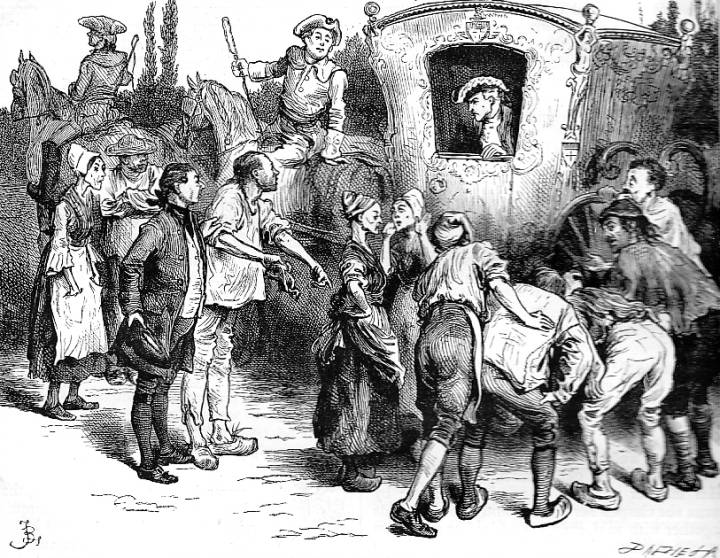
“It was the best of times, it was the worst of times, it was the age of wisdom, it was the age of foolishness, it was the epoch of belief, it was the epoch of incredulity, it was the season of light, it was the season of darkness, it was the spring of hope, it was the winter of despair, we had everything before us, we had nothing before us, we were all going direct to Heaven, we were all going direct the other way– in short, the period was so far like the present period, that some of its noisiest authorities insisted on its being received, for good or for evil, in the superlative degree of comparison only.”
Charles Dickens, A Tale of Two Cities
This famed Dickens quote came to mind as I was pondering what to write this morning. I’ve not read (yet) A Tale of Two Cities. It has joined the queue. But I know the quote. And so this morning when I picked it up and read beyond the first few words, the reason it came to mind in my thinking was even more prevalent.
I often ponder life in this age. What is it? Is it all hopelessness and despair, as some would have us believe? As much as I see the problems of the current age, I’m not so discouraged. And so, “It is the best of times…it is the worst of times” (changed, obviously, for the present tense) seems fitting. But do we recall beyond those first few words? Because Dickens so completely nails it – it is an age of both wisdom and foolishness (although the “wisdom” is a bit harder to find), an epoch of both belief and incredulity, a season of both light and darkness. A spring of hope, a winter of despair (what incredible writing!).
We’re in an age where we’re pulled in so many directions; where even triumphs are celebrated with an air of spitefulness – an undercurrent of angers and resentments. Our teams determine where we stand, whether we believe in that stand wholeheartedly or not. Could it all just be an illusion foisted upon us by a media monster that gravitates toward the tragic? Read the headlines. How much of what we see in reality doesn’t matter, but gives us the impression that we’re living in this world that is dying?
Should we despair?
I chose to log out of that life nearly two years ago – to leave behind my Facebook and Twitter. I replaced the time I spent on such sites with thinking and writing, and I was so much happier for it. Even now, as I use my Facebook account to advertise what I write, I’m brushing against the bad habit again of scrolling through the feed (justifying it by saying to myself “I’m looking for ideas”) and I must admit, I’m not enriched in by it in the slightest. I also read the news. I see what’s going on in the world. I keep looking, but feel like I’m trapped in between. I want to separate myself from the world, and so live a life of curated good; but I also want to know what’s going on in the world so I can be thoughtful and informed in the formulation of my thoughts. Yet, while I think the news (and even how it’s presented) is a good lesson in human nature, I still must admit (as I’m saying here) that what we see and hear is not really what is true about us.
But what is true about us?
I believe in one truth, and it’s not a popular view these days. I believe that the singular truth is that which is found in the Christian faith (but I also believe that it has been obscured by the very people who claim that faith). This is the truth that we are all manipulative and spiteful and scheming and selfish to some degree (and so the obscurity!). But it’s also the truth that we are to care for the poor and hurting (Religion that is pure and undefiled before God the Father is this: to visit orphans and widows in their affliction, and to keep oneself unstained from the world. (James 1:27)). We are to discern attitudes and behaviors among others (and ourselves) that are destructive, but we are also to be compassionate and loving of the very people who engage in such behaviors (read what Paul says in his first letter to the Corinthians, chapter 5, verses 9 – 13 for an interesting take). We are to give and forgive sacrificially. We are to be the hands and feet of Christ himself (only the most cynical and deluded could fault one who is acting as such).
The point though for Christians is to never despair. We can be hurt and heartbroken by the world around us, but we should never give up on God’s creation. To do so would be to deny his purpose in all things. As odd as the Bible book, Revelation, may be to many, it contains stark imagery of how this all ends. I don’t think it’s by accident that the first two and last two chapters of the Bible show us two versions of paradise. No matter how bad it may look, it will never be forever.
Dickens brings to mind another great piece of literature – Solomon’s words in Ecclesiastes:
1For everything there is a season, and a time for every matter under heaven:
2 a time to be born, and a time to die;
Ecclesiastes 3:1-8
a time to plant, and a time to pluck up what is planted;
3 a time to kill, and a time to heal;
a time to break down, and a time to build up;
4 a time to weep, and a time to laugh;
a time to mourn, and a time to dance;
5 a time to cast away stones, and a time to gather stones together;
a time to embrace, and a time to refrain from embracing;
6 a time to seek, and a time to lose;
a time to keep, and a time to cast away;
7 a time to tear, and a time to sew;
a time to keep silence, and a time to speak;
8 a time to love, and a time to hate;
a time for war, and a time for peace.
This is our lot in life while we dwell on earth. This is wisdom. This is an assurance that things will not always be exactly the way we want them to be, but that the answer is really not that far from us. In taking in the whole counsel of God’s word, we can understand life, and in turn understand that even now, in what seems the worst of times, the best is yet to come…

